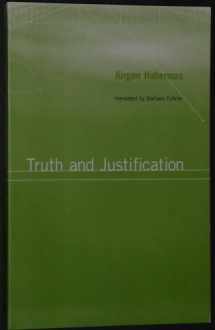
Truth And Justification
ISBN-13:
9780262582582
ISBN-10:
0262582589
Author:
Jurgen Habermas
Publication date:
2005
Publisher:
Mit Pr
Format:
Paperback
327 pages
FREE US shipping
on ALL non-marketplace orders
Marketplace
from $20.95
USD
Marketplace offers
Seller
Condition
Note
Seller
Condition
Used - Good
Cover edges have light shelf wear/ creasing.
Book details
ISBN-13:
9780262582582
ISBN-10:
0262582589
Author:
Jurgen Habermas
Publication date:
2005
Publisher:
Mit Pr
Format:
Paperback
327 pages
Summary
Truth And Justification (ISBN-13: 9780262582582 and ISBN-10: 0262582589), written by authors
Jurgen Habermas, was published by Mit Pr in 2005.
With an overall rating of 4.1 stars, it's a notable title among other
books. You can easily purchase or rent Truth And Justification (Paperback) from BooksRun,
along with many other new and used
books
and textbooks.
And, if you're looking to sell your copy, our current buyback offer is $0.3.
Description
Jurgen Habermas has developed the theory of communicative action primarily in the context of critical social and political theory and discourse ethics. The essays collected in this volume, however, focus on the theory's implications for epistemology and metaphysics. They address two fundamental issues that have not figured prominently in his work since the early 1970s. One is the question of naturalism: How can the ineluctable normativity of the perspective of agents interacting in a linguistically structured lifeworld be reconciled with the contingency of the emergence and evolution of forms of life? The other is a key problem facing epistemological realism after the linguistic turn: How can the assumption that there is an independently existing world be reconciled with the linguistic insight that we cannot have unmediated access to "brute" reality? Truth and Justification collects Habermas's major essays on these topics published since the mid-1990s. They offer detailed discussions of truth and objectivity as well as an account of the representational function of language in terms of the formal-pragmatic framework he has developed. In defending his post-Kantian pragmatism, Habermas draws on both the continental and analytic traditions and endorses a weak naturalism and a form of epistemological realism.


We would LOVE it if you could help us and other readers by reviewing the book
Book review

Congratulations! We have received your book review.
{user}
{createdAt}
by {truncated_author}


